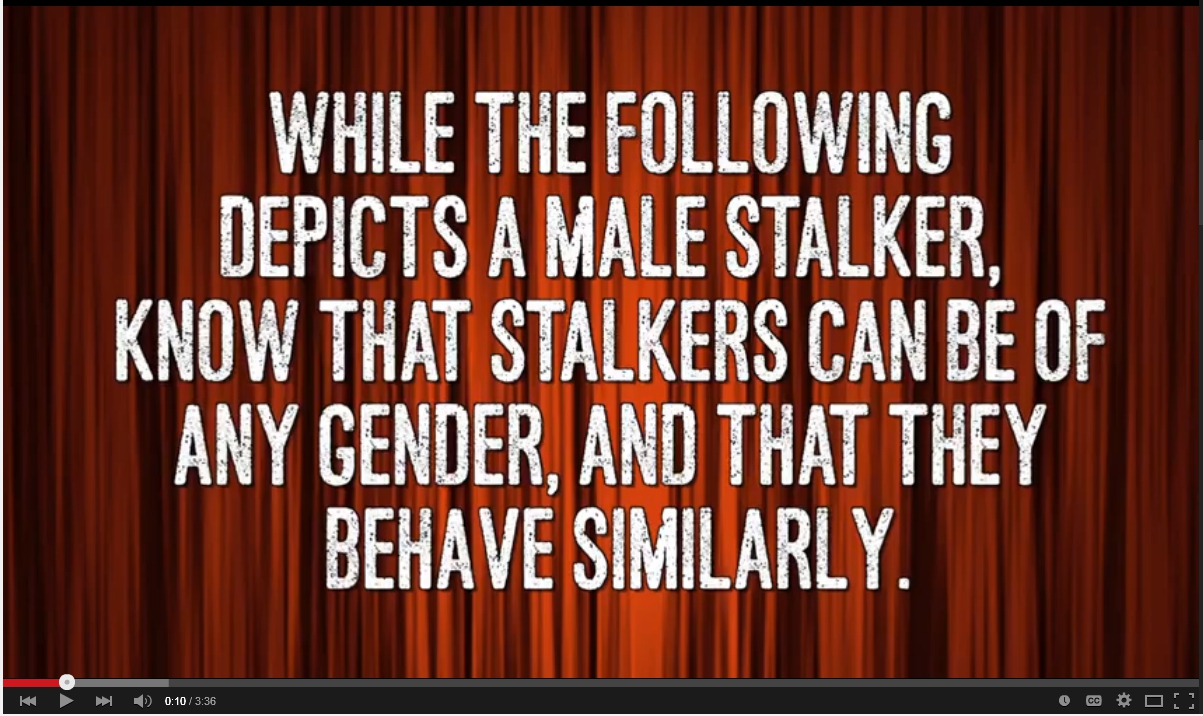What is Stalking?
Stalking is an unwanted course of conduct wherein an individual willfully and repeatedly engages in a knowing course of harassing conduct directed at another person, which reasonably and seriously alarms, torments, or terrorizes that person or their family. Stalking involves one person's obsessive behavior toward another person.
Trust your instincts, please seek help if you are experiencing the following:
hypervigilance, anxiety or feeling "on edge" about what the stalker might do
changes to your behavior (i.e., eating or sleeping patterns) or routines in order to avoid the stalker
unwanted gifts, cards or letters
threats to hurt your family, friends, or pets
damage to your personal property, car, or home
surveillance of phone calls, computer use or social media platforms
Things You Can Do

Stalking is unpredictable, and no two situations are the same. While you can take steps to increase your safety, there is no guarantee that it will work for everyone.
- Don't communicate with the stalker or respond to their attempts to contact you.
- If you are in immediate danger, call 911. Trust your instincts, and don't downplay the danger.
- Notify law enforcement: Request that law enforcement agencies log your complaint each time you call whether they respond or not. Request a copy of the report.
- Contact a crisis hotline, victim services agency, or a domestic violence or rape crisis program. They can help you devise a safety plan, give you information about local laws, weigh options such as seeking a protection order and refer you to other services.
- Protection Order: You will need to go to court to get a criminal warrant and then file for a protective order. While the stalker may not respect the order, the police are required to make an arrest if the order is violated.
- Document everything: Record any information that you or any witnesses can provide.
- Tell everyone: Give friends, neighbors, coworkers and family members a description of the stalker. Ask them to watch for him/her, document everything listed above and give you a written account for your records.
- Take pictures: When you see the stalker, try to take a photo or videotape if it's safe to do so.
- Press charges: Call the police each time the stalker breaks a law. The stalker should be arrested, bonded, and then released. Request that one of the terms of the bond be that the stalker may not have any contact with you at all. Obtain copies of all documents and the name of the arresting officer.
- Save all communications: Save and date all cards, letters, notes, envelopes, e-mails, and taped messages on your telephone answering machine that are from the stalker.
- Keep all legal documents: Obtain copies of protection orders, court orders, etc.
- Make it hard to track you down:
- Alter travel routes and routines.
- Obtain a post office box.
- Give your address and phone number to as few people as possible. Inform professional organizations that they are to provide no one with information about you.
- Post a No Trespassing sign on the edge of your property where it is clearly visible.
- Report any threatening calls to the telephone company.
- Report to the FBI all threats sent by mail.
- If you move:
- Don't ask the post office to forward your mail. Have them hold it for you
- Take all important records with you: your (and your children's) medical, financial, academic records, Social Security cards, green cards, passports, driver's licenses, etc.
The National Center for Victims of Crime
Stalking Resource Center (2012b) provides a number of online resources for victim services providers to aid in promoting victim safety, which can be found at https://victimsofcrime.org/

